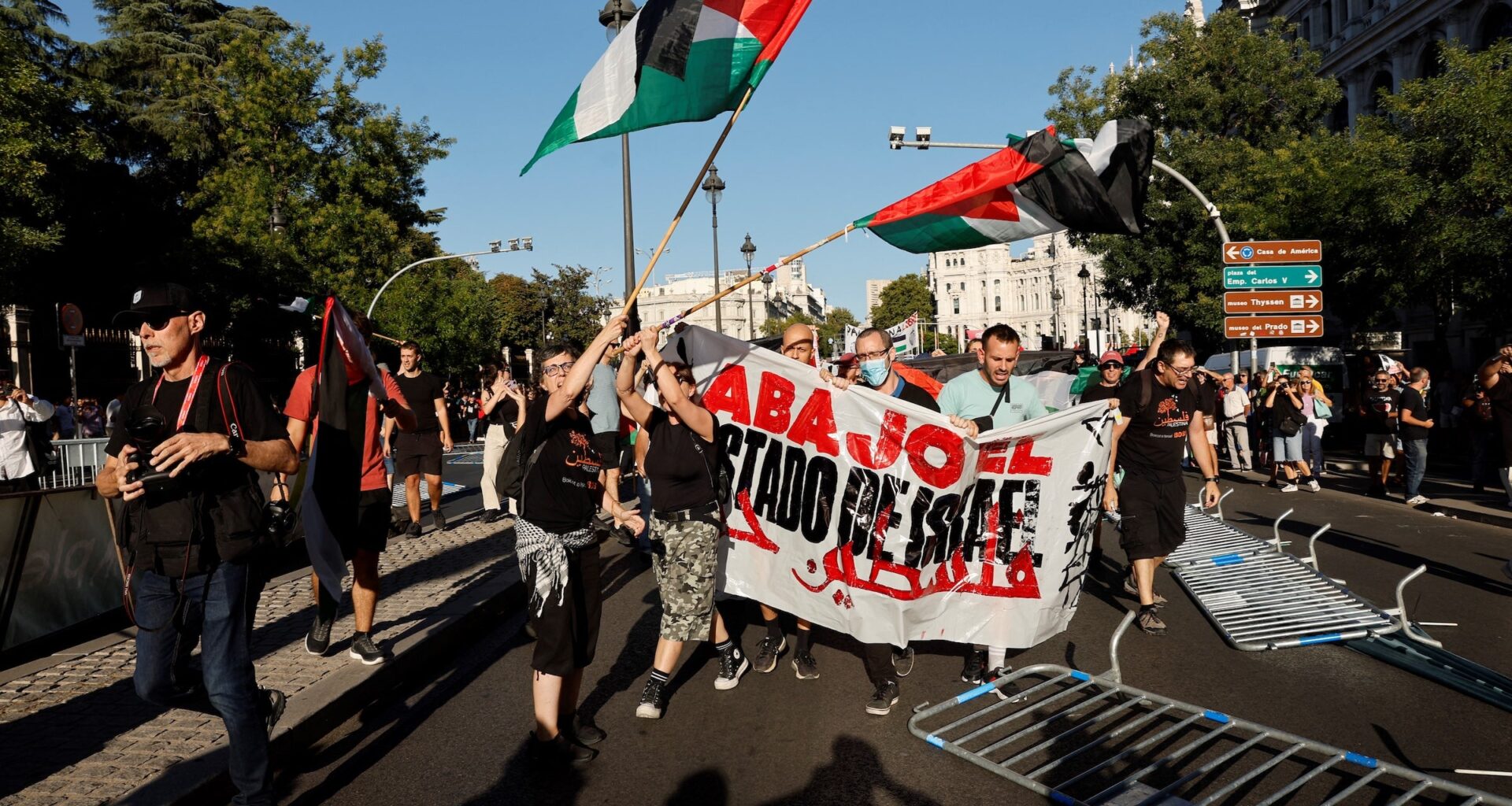‘No one thought we’d make it to Madrid:’ With the 2026 Tour de France opening in Spain and IPT’s WorldTour return looming, anxiety shifts to next season.
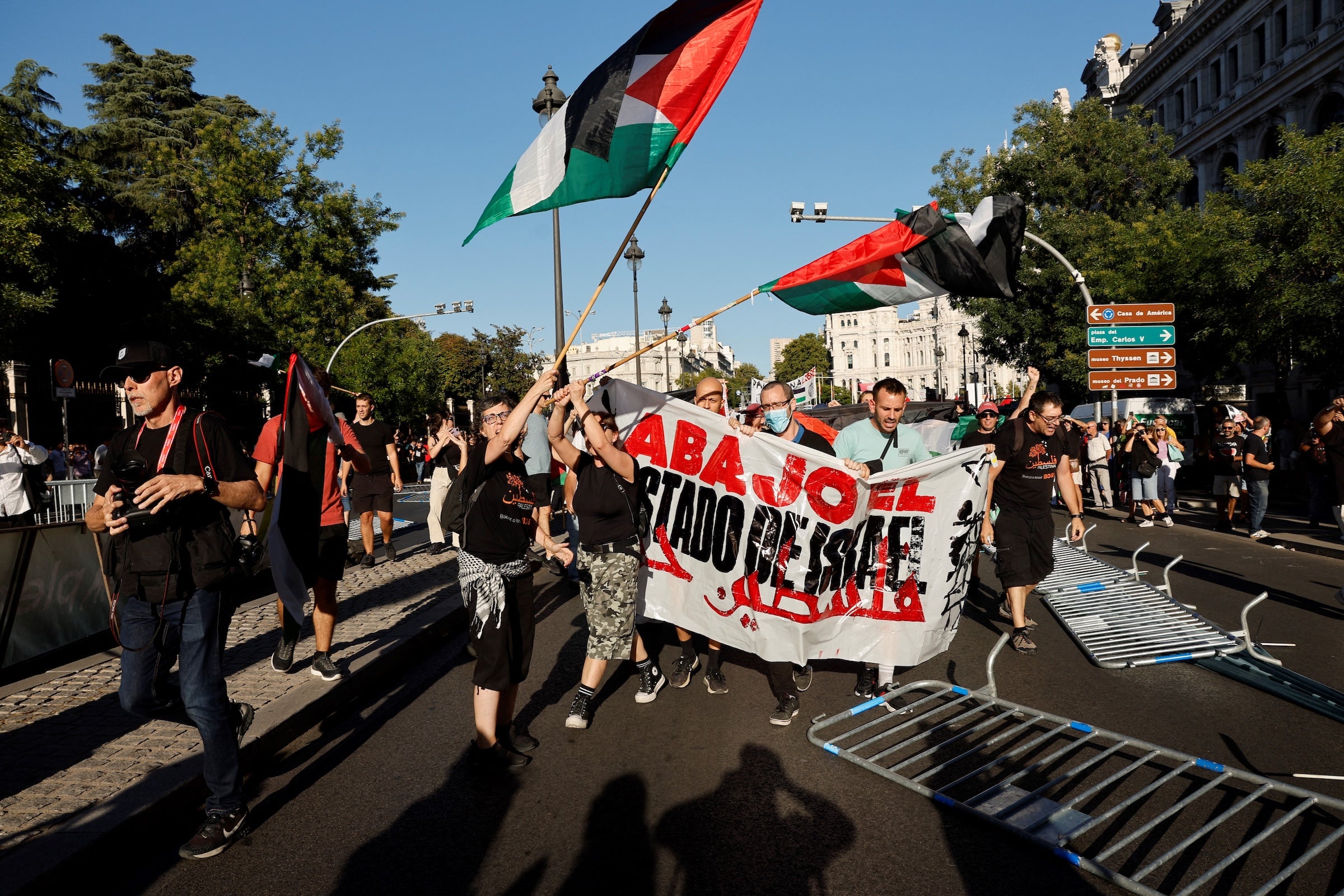
Protesters forced the cancelation of Sunday’s stage and the podium ceremony. (Photo: Oscar DEL POZO / AFP )
Updated September 16, 2025 03:50AM
Fallout from Sunday’s unprecedented protests that stopped the Vuelta a España in its tracks continues to reverberate.
The Vuelta made international headlines when thousands of pro-Palestinian protesters poured onto the streets of Madrid, forcing race organizers to neutralize the closing stage and cancel the final podium ceremony held each year in the famed Cibeles plaza.
More than 20 police officers were injured and dozens arrested after angry protesters capped nearly two weeks of heavy pressure on the Vuelta race organization.
Javier Guillén, director of La Vuelta, held a press conference Monday as crews cleaned up the mess in the downtown streets of Madrid.
“We are going to keep working to bring the race forward. It is one of the most important events we have in Spain, and we all have to stand behind La Vuelta,” Guillén said Monday. “When you call for a boycott of the race, of course, it causes damage. We didn’t go to any war, and this should not be understood as triumphalism, but we have completed the race.”
The protests became a political hot potato in ideologically polarized Spanish politics, with Spain’s prime minister Pedro Sánchez applauding the protesters’ actions, comments that drew condemnation not only within Spain but also from Israeli government officials.
Everyone within cycling is still shaken by what happened over the past few weeks as the Vuelta raced through a protest movement that challenged the race and professional cycling in an unparalleled way.
One Vuelta official told El Mundo that they feared this might not be the last time this happens.
“This is a before and after,” the Vuelta official said. “This shows how vulnerable cycling is. It’s difficult imagining something like this happening in other sports.”
‘Nothing made us think this would happen’
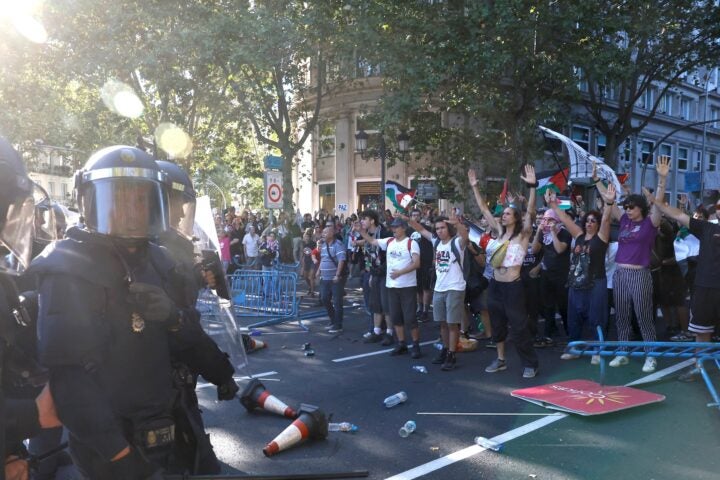 Protesters forced organizers to cancel the closing stage and the final podium ceremony. (Photo: PIERRE-PHILIPPE MARCOU/AFP via Getty Image)
Protesters forced organizers to cancel the closing stage and the final podium ceremony. (Photo: PIERRE-PHILIPPE MARCOU/AFP via Getty Image)
Protests targeting Israel-Premier Tech blew up during the stage 5 team time trial when the Vuelta returned to Spanish roads after four stages in Italy and France.
The team has been a target of mild protesters waving flames and booing since the Gaza war began more than two years ago, but this Vuelta was different.
Activists organized via social media and vented their frustration and anger over the ongoing Gaza war that’s displaced millions and left more than 60,000 people dead, according to UN estimates.
“Nothing in Turin made us think this would happen,” Guillén said. “This is the hardest Vuelta I have ever experienced. La Vuelta is a global event, and that is one of the reasons why we have seen what we saw.”
Tensions built across the second week, including more intrusive protests that knocked Simone Petilli off his bike in stage 10 when protesters stormed onto the race course. Things came to a head in stage 11 in Bilbao, when angry mobs pushed against barriers and forced organizers to neutralize the finish and take GC times 3km from the finish line.
After the finish-line mayhem in Bilbao, there was heavy pressure from race organizers and teams for Israel-Premier Tech to leave the race.
Cycling’s governing body the UCI released a public statement condemning the violent protests but confirming that Israel-Premier Tech had a right to race.
Team owner Sylvan Adams refused to leave and the protests escalated into the second and final week until Sunday’s urban chaos.
By then, the protests were more about the atrocities happening in Gaza than anything to do with the Vuelta.
Guillén said La Vuelta had its hands tied and scrambled to keep the race from falling apart.
“La Vuelta has remained neutral. We told the UCI that there was a problem, there were conversations, but they said the team had to race, and the team didn’t decide to withdraw either. We did what we had to do,” Guillén said Monday.
“No federation has banned Israel from its competitions, nor has the European Union. The UCI issued its statement, and I understand that it is aware of what has happened.
‘Everyone doubted the race would make it to Madrid’
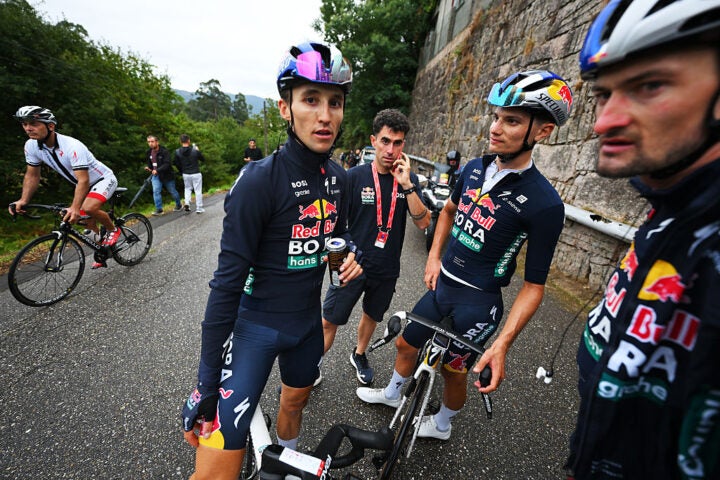 Riders mill around after the stage was shortened by protesters in week 3. (Photo: Tim de Waele/Getty Images)
Riders mill around after the stage was shortened by protesters in week 3. (Photo: Tim de Waele/Getty Images)
Protests grew in size and intensity across the second half of the Vuelta, with Movistar’s Javier Romo being knocked off his bike and eventually being forced to abandon in a crash provoked by a protester trying to charge into the oncoming peloton.
Crowds momentarily blocked the iconic climb up Angliru and, a few days later, forced organizers to stop stage 16 some 8km short of the finish line.
Race organizers, quietly growing worried the race might be canceled outright, declared a winner with Egan Bernal, in part to assure that at least 15 stages were officially contested to meet the minimum set by UCI rules for a grand tour.
Riders and staffers said they were growing exasperated after being booed, spat upon, called assassins and being accused of supporting genocide.
The disruptions split the peloton. Jonas Vingegaard — who voiced his support for the cause of the supporters and their right to protest — said the race was dominated by uncertainty.
“Everyone doubted after the second rest day if the Vuelta would make it to Madrid,” Vingegaard said.
What makes cycling so appealing — its open-road closeness to fans — was turning into its weakest point during this Vuelta.
Everyone agreed the demonstrators had a right to protest, but said they were going too far by trying to interrupt the race.
Tom Pidcock said disrupting the Vuelta would not “help their cause,” and the peloton voted privately to continue in the Vuelta only if there were not more disruptions.
“There are many sports in which Israeli teams compete, and it seems that only the Vuelta is affected by it. I support any protest, but when they go onto the road, I lose respect,” said Spain’s Juan Ayuso.
Impromptu podium: ‘Pity that was taken from us’
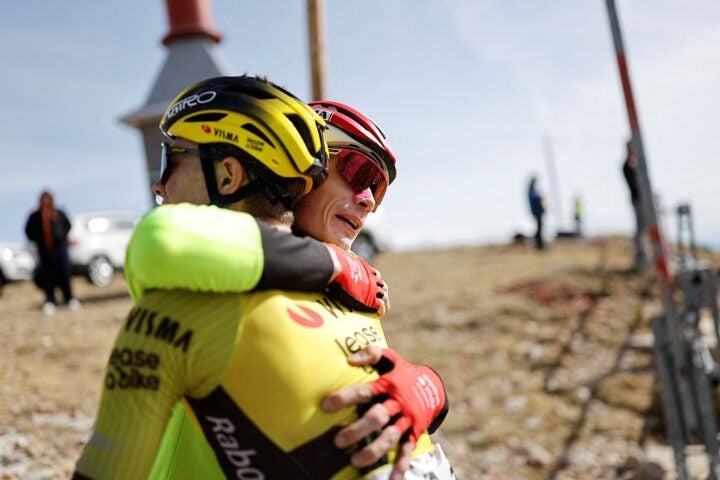 Vingegaard was denied a chance to celebrate his podium in Madrid. (Photo by OSCAR DEL POZO/AFP via Getty Images)
Vingegaard was denied a chance to celebrate his podium in Madrid. (Photo by OSCAR DEL POZO/AFP via Getty Images)
Sunday’s final stage started normally enough out on the outskirts of Madrid, but thousands of protesters were massing in the city center. Despite the presence of 1,500 police officers, hordes poured onto the road at several choke points along the final circuit before the peloton even arrived.
Officials had no choice but to cancel the final stage, with official times taken at 44km to go. Protests continued into the night as protesters battled with police and the Vuelta made international headlines.
Feeling cheated out of their moment on the winner’s podium, teams quickly organized their own impromptu podium celebration.
Riders gathered in a hotel parking garage and stood on coolers in front of a hastily erected Vuelta backdrop and celebrated their victories and podium spots.
“It’s a pity that such a moment of eternity was taken from us. I’m really disappointed about that,” Vingegaard said. “I was looking forward to celebrating this overall win with my team and the fans. Everyone has the right to protest, but not in a way that influences or endangers our race.”
For the riders, the Vuelta was done.
‘Cycling is vulnerable’
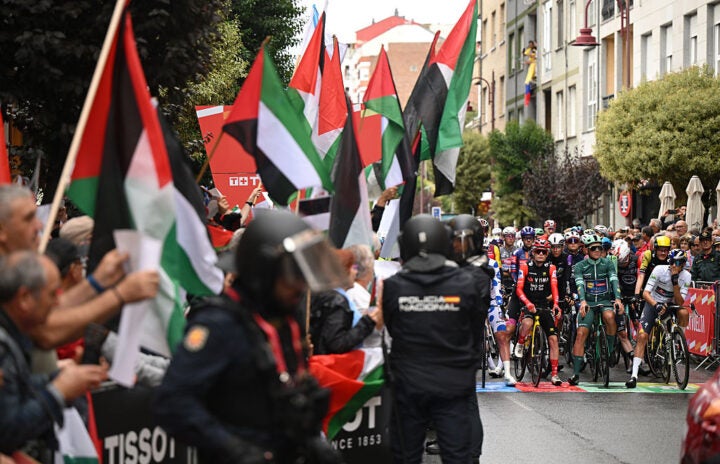 Protests grew in intensity and size as the Vuelta progressed. (Photo: Dario Belingheri/Getty Images)
Protests grew in intensity and size as the Vuelta progressed. (Photo: Dario Belingheri/Getty Images)
That marked the official end of a Vuelta that was struck by protests that are unprecedented in cycling history.
The Tour de France and other races have been the targets of one-off protests from environmental activists, striking unions, or local farmers, but never on the scale of what happened during the Vuelta.
With Israel-Premier Tech expected to be a WorldTour team in 2026 and next year’s Tour de France slated to begin in Barcelona, the concerns about further protests will weigh on everyone’s minds.
“I don’t want to speculate about the start of the 2026 Tour in Barcelona,” Guillén said Monday. “We have to carry out an internal discussion. La Vuelta has been a trigger for reflection. Cycling is vulnerable. I hope it won’t be like that.”
The UCI remains tight-lipped on the protests and will likely follow any lead from the major sporting institutions, like the International Olympic Committee, which, so far, has not condemned Israel.
The Israel-Premier Tech team — which is privately owned by Canadian-Israeli billionaire Adams and has no official affiliation with the Netanyahu government — did not comment after Sunday’s finale, other than posting congratulations to American Matthew Riccitello for winning the best young rider’s jersey and finishing fifth.
Most riders were muted in their public reaction, for fear of fallout from social media or being singled out as a future target in the highly polarizing issue of the ongoing Gaza war.
Michal Kwiatkowski, a veteran on Ineos Grenadiers, is one of the few who went to social media to post his thoughts after racing the Vuelta.
“If the UCI and the responsible bodies couldn’t make the right decisions early enough, then long-term it’s very bad for cycling that the protesters managed to get what they wanted. You can’t just pretend nothing is happening,” Kwiatkowski wrote on X.
“From now on, it’s clear for everyone that a cycling race can be used as an effective stage for protests and next time it will only get worse, because someone allowed it to happen and looked the other way. It’s a shame for the fans who came here to watch a great event. Personally, I would have preferred to know in advance that the race was cancelled rather than being led to believe everything was going to be fine.”
La Vuelta 2025 is now in the books, but some are worried this could become a before-and-after moment for open-road professional cycling.

